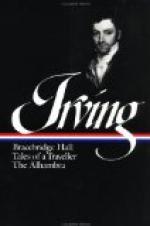As I was rambling pensively through a neighboring meadow, in which I had many a time gathered primroses, I met the very pedagogue who had been the tyrant and dread of my boyhood. I had sometimes vowed to myself, when suffering under his rod, that I would have my revenge if ever I met him when I had grown to be a man. The time had come; but I had no disposition to keep my vow. The few years which had matured me into a vigorous man had shrunk him into decrepitude. He appeared to have had a paralytic stroke. I looked at him, and wondered that this poor helpless mortal could have been an object of terror to me! That I should have watched with anxiety the glance of that failing eye, or dreaded the power of that trembling hand! He tottered feebly along the path, and had some difficulty in getting over a stile. I ran and assisted him. He looked at me with surprise, but did not recognize me, and made a low bow of humility and thanks. I had no disposition to make myself known, for I felt that I had nothing to boast of. The pains he had taken and the pains he had inflicted had been equally useless. His repeated predictions were fully verified, and I felt that little Jack Buckthorne, the idle boy, had grown up to be a very good-for-nothing man.
This is all very comfortless detail; but as I have told you of my follies, it is meet that I show you how for once I was schooled for them.
The most thoughtless of mortals will some time or other have this day of gloom, when he will be compelled to reflect. I felt on this occasion as if I had a kind of penance to perform, and I made a pilgrimage in expiation of my past levity.
Having passed a night at Leamington, I set off by a private path which leads up a hill, through a grove, and across quiet fields, until I came to the small village, or rather hamlet of Lenington. I sought the village church. It is an old low edifice of gray stone on the brow of a small hill, looking over fertile fields to where the proud towers of Warwick Castle lifted themselves against the distant horizon. A part of the church-yard is shaded by large trees. Under one of these my mother lay buried. You have, no doubt, thought me a light, heartless being. I thought myself so—but there are moments of adversity which let us into some feelings of our nature, to which we might otherwise remain perpetual strangers.
I sought my mother’s grave. The weeds were already matted over it, and the tombstone was half hid among nettles. I cleared them away and they stung my hands; but I was heedless of the pain, for my heart ached too severely. I sat down on the grave, and read over and over again the epitaph on the stone. It was simple, but it was true. I had written it myself. I had tried to write a poetical epitaph, but in vain; my feelings refused to utter themselves in rhyme. My heart had gradually been filling during my lonely wanderings; it was now charged to the brim and overflowed. I sank upon




